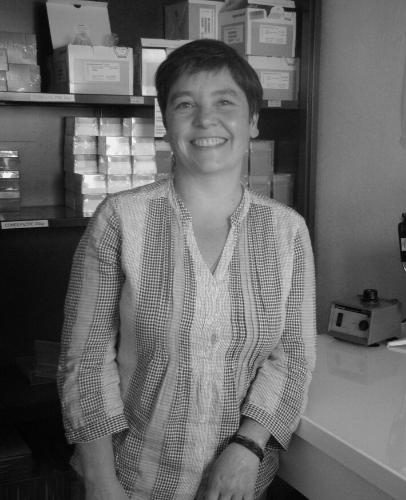Sophie Lanone Wants to Influence the Course of Respiratory Diseases
Sophie Lanone has been working on respiratory diseases since her PhD, more than 20 years ago. Her intention is to discover the internal and external factors that influence the development of chronic obstructive pulmonary disease (COPD) and cystic fibrosis. The receipt of a European contract, granting her €11 million to explore these interactions over the next five years, marks a new stage in her career.

Sophie Lanone is too modest: she considers what she does to be background work, but this Inserm Research Director who manages a 40-member team (Genetic and environmental interactions in COPD, cystic fibrosis and other (rare) respiratory diseases – GEIC2O) at the Mondor Institute of Biomedical Research (IMRB)* in Créteil, is moving mountains! She recently won a European contract worth over €11 million in order to further knowledge of respiratory diseases. In addition to the projects ongoing in her laboratory, she and her team will study the impact of internal and external factors on the course of respiratory diseases: pollution, noise, household composition, lifestyle and standard of living, etc., but also epigenetics and lipidomics (i.e. study of the body’s lipid makeup). A five-year project that falls in line with Europe’s desire to explore the human health consequences of what scientists call the exposome.
Lanone devised the project, called REMEDIA, after several years spent studying the impact of the environment on respiratory diseases. « Following a postdoc in emphysema (a component of COPD) at Yale University (USA), I joined Inserm’s Pathophysiology and Epidemiology of Respiratory Insufficiency unit (Paris) in 2002. Seven years later, I transferred to Créteil where I co-led the « Respiratory effects of environmental contaminants » team from 2015. And then I have been team leader of GEIC2O since January 2020 », she says. « Thanks to REMEDIA, I hope to resolve a very important question: why two individuals with smoking-related COPD, or two cystic fibrosis patients with the same genetic mutation, present variable symptoms and have a different outcomes? The reasons for this remain a mystery. We need to discover the factors involved in modifying the course of these diseases. What I would like is that one day, thanks to our research, doctors will be able to predict the outcomes of their patients’ conditions, according to their genetics, environment, and lifestyle », adds the researcher.
The project is designed in the manner of a toolbox, with various complementary subprojects: engineering work to develop sensors, preclinical studies, the follow-up of five cohorts of individuals, mothers-children, children or adults., etc. And for that, Lanone has surrounded herself with the best: « I needed a very high level of multidisciplinarity, so I « recruited » various foreign laboratories that will each enrich the research with their specific expertise ». In the end, what she has created is no less than a consortium of 13 teams from nine European countries.
The researcher makes no secret of the project’s potential for forming new collaborations and enriching her journey: « REMEDIA will probably lead to all sorts of discoveries and results. But this funding opens up many other opportunities and will certainly be a turning point in my career. The European Commission has, for example, asked the various project initiators who obtained such contracts through H2020 − nine of us, in total − to work together on ways to promote and progress in exposome research tools and techniques. This promises great encounters and progress », she smiles.
The REMEDIA project coordinated by Sophie Lanone is backed by a European contract awarded as part of the Health, Wellbeing and Aging Societal Challenges of Horizon 2020, the European Union program for the funding of research and innovation.
Note :
*unit 955 Inserm/UPEC, Mondor Institute of Biomedical Research, Créteil
